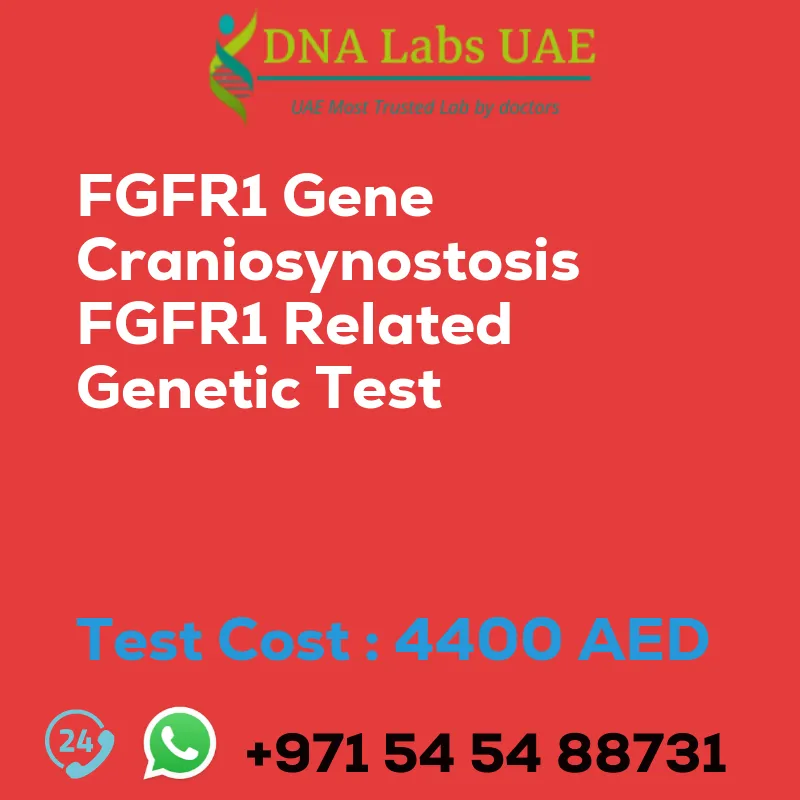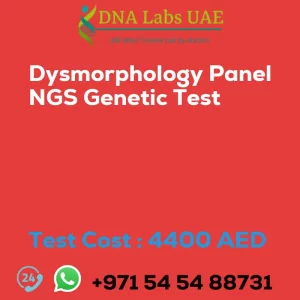FGFR1 Gene Craniosynostosis FGFR1 related Genetic Test
Test Components
- Price: 4400.0 AED
- Sample Condition: Blood or Extracted DNA or One drop Blood on FTA Card
- Report Delivery: 3 to 4 Weeks
- Method: NGS Technology
- Test Type: Dysmorphology
- Doctor: Pediatrics
- Test Department: Genetics
Pre Test Information
Clinical History of Patient who is going for FGFR1 Gene Craniosynostosis, FGFR1 related NGS Genetic DNA Test. A Genetic Counselling session to draw a pedigree chart of family members affected with FGFR1 Gene Craniosynostosis, FGFR1 related NGS Genetic DNA Test gene FGFR1.
Test Details
Craniosynostosis is a condition characterized by the premature fusion of one or more sutures in the skull, leading to abnormal skull shape and potentially affecting brain growth and development. The FGFR1 gene is one of several genes that have been associated with craniosynostosis. FGFR1 codes for a protein called fibroblast growth factor receptor 1, which is involved in cell signaling and regulation of cell growth and differentiation.
An NGS (Next-Generation Sequencing) genetic test is a type of genetic test that can analyze multiple genes simultaneously, providing a comprehensive analysis of an individual’s genetic makeup. In the case of FGFR1-related craniosynostosis, an NGS genetic test can identify any mutations or variations in the FGFR1 gene that may be contributing to the development of craniosynostosis.
By identifying specific genetic variants in the FGFR1 gene, an NGS genetic test can help in confirming a diagnosis of FGFR1-related craniosynostosis and provide information about the specific genetic cause of the condition. This information can be useful for genetic counseling, family planning, and potentially guiding treatment decisions.
It is important to note that FGFR1-related craniosynostosis is a rare condition, and not all cases of craniosynostosis are caused by mutations in the FGFR1 gene. Other genes, such as FGFR2 and FGFR3, have also been associated with craniosynostosis, and a comprehensive genetic test may include analysis of multiple genes to provide a more complete picture of the genetic causes of craniosynostosis.
| Test Name | FGFR1 Gene Craniosynostosis FGFR1 related Genetic Test |
|---|---|
| Components | |
| Price | 4400.0 AED |
| Sample Condition | Blood or Extracted DNA or One drop Blood on FTA Card |
| Report Delivery | 3 to 4 Weeks |
| Method | NGS Technology |
| Test type | Dysmorphology |
| Doctor | Pediatrics |
| Test Department: | Genetics |
| Pre Test Information | Clinical History of Patient who is going for FGFR1 Gene Craniosynostosis, FGFR1 related NGS Genetic DNA Test. A Genetic Counselling session to draw a pedigree chart of family members affected with FGFR1 Gene Craniosynostosis, FGFR1 related NGS Genetic DNA Test gene FGFR1 |
| Test Details |
Craniosynostosis is a condition characterized by the premature fusion of one or more sutures in the skull, leading to abnormal skull shape and potentially affecting brain growth and development. The FGFR1 gene is one of several genes that have been associated with craniosynostosis. FGFR1 codes for a protein called fibroblast growth factor receptor 1, which is involved in cell signaling and regulation of cell growth and differentiation. An NGS (Next-Generation Sequencing) genetic test is a type of genetic test that can analyze multiple genes simultaneously, providing a comprehensive analysis of an individual’s genetic makeup. In the case of FGFR1-related craniosynostosis, an NGS genetic test can identify any mutations or variations in the FGFR1 gene that may be contributing to the development of craniosynostosis. By identifying specific genetic variants in the FGFR1 gene, an NGS genetic test can help in confirming a diagnosis of FGFR1-related craniosynostosis and provide information about the specific genetic cause of the condition. This information can be useful for genetic counseling, family planning, and potentially guiding treatment decisions. It is important to note that FGFR1-related craniosynostosis is a rare condition, and not all cases of craniosynostosis are caused by mutations in the FGFR1 gene. Other genes, such as FGFR2 and FGFR3, have also been associated with craniosynostosis, and a comprehensive genetic test may include analysis of multiple genes to provide a more complete picture of the genetic causes of craniosynostosis. |








